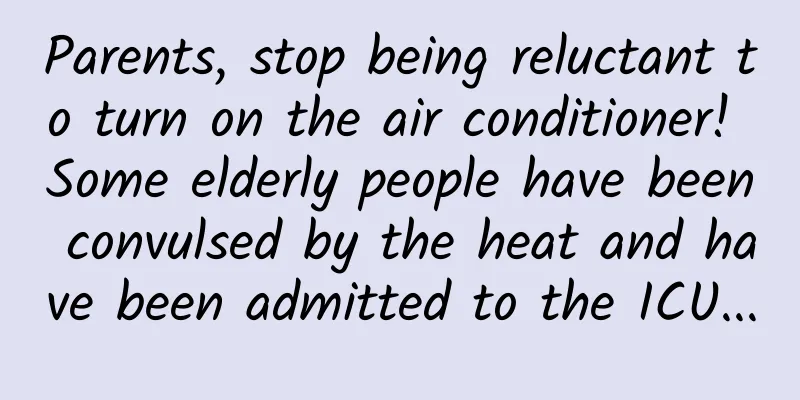Parents, stop being reluctant to turn on the air conditioner! Some elderly people have been convulsed by the heat and have been admitted to the ICU...

|
It’s too hot! In recent days, 40℃ is becoming a common occurrence. Francis, a senior expert at the Woodwell Climate Research Institute in the United States, said that although the accurate temperature records currently available to scientists only began in the middle of the last century, he calculated that the past week was likely to be "the hottest week in 100,000 years." As the impact of El Niño gradually becomes apparent, global temperatures are expected to rise further. Image of high temperature weather forecast. Image source: China National Meteorological Observatory This kind of weather is a severe challenge for everyone, especially the elderly. Because the body temperature regulation mechanism of the elderly is not as effective as that of young people, and many of them have underlying diseases, they are more susceptible to the negative effects of high temperatures. More importantly, many elderly people are reluctant to turn on the air conditioner in summer, which makes the high temperature have a greater impact on them. Recently, a hospital in Hangzhou received a 79-year-old patient, Grandma Zhang, who suffered from heat cramps. It is understood that Grandma Zhang is an elderly woman living alone. She sat at home without turning on the air conditioner or fan. Due to the excessive heat in the room, she suffered heat cramps and fell into a coma. She was later found by her children and was rescued. Currently, the elderly woman is still in the ICU. Image source: Qianjiang Evening News 01 Effects of high temperatures on the health of the elderly The impact of extreme weather on the health of the elderly is comprehensive and significant. Surveys show that extremely high temperatures have a greater negative impact on the elderly’s self-perception, daily activities, and chronic diseases than extremely low temperatures. [1] The Lancet Countdown Global Report [2] shows that the number of heat-related deaths among the elderly has increased by 54% over the past 20 years. In 2018, 296,000 elderly people lost their lives due to heat. In 2019, the number of days that people aged 65 and above were exposed to heat wave risks increased by 29 days, twice the previous record. 02 Why is it easier for older people Threatened by hot weather 1. Older people are less able to adapt to sudden changes in temperature than younger people. The human body has a mechanism for adapting to temperature changes, which allows the body temperature to remain relatively constant despite changes in the external temperature. However, as time goes by and people age, this mechanism becomes weaker and weaker [3]: Sweating is the body's main way to dissipate heat in response to high temperatures, but the amount of sweat produced by each sweat gland in the elderly decreases, and the overall sweat rate decreases, making it more difficult to dissipate heat than in young people, resulting in more heat being stored in the body, and the core temperature is more likely to rise to dangerous levels. Image: Schematic diagram of automatic temperature regulation. Image source: Medical Encyclopedia The amount of blood flowing from the heart to the skin is also critical in order to carry away the core temperature. The study found that older adults had less increase in skin blood flow for a given change in core temperature than younger adults, and skin blood flow in older adults did not increase as rapidly over time as in younger adults. 2. They are more likely to have chronic conditions that alter the body’s normal response to heat Older people are more likely to have existing medical conditions, and hot weather can make existing conditions worse, especially for people with heart disease. High temperatures and humidity cause more blood to flow to the skin, causing the heart to beat faster and circulate twice as much blood per minute as in a normal day, all of which puts added stress on the heart. 3. They are more likely to take prescription medications that affect the body’s ability to control temperature or sweat Many drugs can also affect the body's temperature regulation. For example, propranolol, used to treat arrhythmias and hypertension, causes a decrease in cardiac output and reduced blood flow to the skin. Diuretics used to treat heart failure and kidney disease promote dehydration, which itself is a dangerous complication during high temperatures. Diphenhydramine, used to treat allergies and Parkinson's disease, reduces sweating rate and reduces heat dissipation. 03 How do older people cope with the threat of high temperatures? High temperatures are a huge threat to health and may even threaten life. When facing high temperatures, the elderly need to do the following: 1. Pay attention to weather forecasts and reduce the frequency and duration of going out on hot days The elderly should pay more attention to weather forecasts and reduce the frequency and time of going out in hot weather. If they must go out, it is recommended to travel with companions and avoid the time period with the highest temperature in the day (such as 10 am to 3 pm). Try to move or rest in the shade as much as possible and avoid direct sunlight. 2. Choose light, sun-protective clothing When going out, choose clothes and pants that are light, loose, and sun-protective. Be sure to carry enough water. After sweating profusely, replenish electrolyte water to avoid hyponatremia and hypokalemia, which may cause weakness or even coma, both of which are very dangerous in hot weather. If you feel weak, nauseous, dizzy, have a rapid heartbeat, or have a dry mouth, you need to be alert. These are dangerous signs. Quickly find a cool place or a cool room to hide and ask for help. Copyright images in the gallery. Reprinting and using them may lead to copyright disputes. 3. Turn on the air conditioner, don’t force it to save electricity When you are indoors, remember to turn on the air conditioner to avoid high temperatures indoors. Even if there is no direct sunlight, you can still get heatstroke. However, it is not recommended for the elderly to turn on the air conditioner at too low a temperature or for too long. In terms of temperature, it is most appropriate to keep the indoor and outdoor temperature difference at around 7°C. Turn off the air conditioner every 2 hours, open the windows for ventilation, and drink more warm water when using the air conditioner to reduce the problem of dry air and water loss caused by closing the windows in the room. In addition, the air outlet of the air conditioner must not blow directly at people. Especially the elderly should pay attention to protecting important parts such as shoulders, necks, and knees when using the air conditioner. Every year before using the air conditioner, be sure to replace the filter. This is because if the inside of the air conditioner is not cleaned for a long time, it is easy for various bacteria and molds to grow. As the air is released into the room, the elderly and children with weak immunity may develop air-conditioning-related pneumonia[4]. When dealing with the threat of high temperatures, prevention is paramount and maintaining good living habits can reduce risks. References: [1] Chen Y, Qin X. The Impact of Extreme Temperature Shocks on the Health Status of the Elderly in China. Int J Environ Res Public Health. 2022;19(23):15729. [2] Watts N, Amann M, Arnell N, et al. The 2020 report of The Lancet Countdown on health and climate change: responding to converging crises [published correction appears in Lancet. 2020 Dec 14;:]. Lancet. 2021;397(10269):129-170. [3] Balmain BN, Sabapathy S, Louis M, et al. Aging and Thermoregulatory Control: The Clinical Implications of Exercising under Heat Stress in Older Individuals. Biomed Res Int. 2018;2018:8306154. [4] https://cma.org.cn/art/2022/6/16/art_4584_45498.html Author: Jiang Yongyuan, Master of Internal Medicine, Third Military Medical University Reviewer: Tang Qin, Director of the Science Popularization Department of the Chinese Medical Association |
<<: Technology "cultivates" innovation丨You have a "news" from the Cambrian period
>>: Food is the most important thing for people. Are we eating right?
Recommend
2007-2015: Two tables to show the competition history between iPhone and Android
Mary Meeker has released the 2016 Internet Trends...
Download the complete set of videos for first-level construction engineers, Baidu cloud of first-level construction engineer videos in 2020!
[Abstract] Download the complete set of videos on...
Gained 30,000 followers in 7 days at no cost, the growth history of a Douyin newbie!
What if you want to gain 1 million followers in 7...
The relationship between the three new cases, the locations involved, and the timeline are all in one picture →
Beijing Daily Client Reporter Hu Decheng Gao Shan...
iPad5 and iPad4 are very different, most users are willing to upgrade
[September 9 news] It is estimated that many neti...
Baidu World Conference 2017: Multiple AI products and applications launched
On November 16, the 2017 Baidu World Conference w...
GAC Group and Volcano Engine Signed a Strategic Cooperation Agreement
On August 2, GAC Group and Volcano Engine held a ...
World Oral Health Day丨Why do some people, at a young age, have “a car parked” in their mouths?
Why do some people, at a young age, have a car pa...
Free data for life? SAIC-GM upgrades its Internet of Vehicles service
On August 23, SAIC-GM announced that it will laun...
How to customize SEM promotion plan?
When doing promotion, the first thing to confirm ...
Going to the five oceans to explore energy! What major breakthroughs have been made in China's deep-sea oil and gas development?
Author: Duan Yuechu and Huang Xiangjiang In recen...
8 ideas for Baidu promotion plan
In fact, promoting the Internet is not difficult,...
Understand the principle of double bidding and 7 major advertising techniques in one article
Recently, I saw an optimizer complain in a group:...
It's an eyesore! After clicking on the information flow ad, I actually saw this...
I have talked about many information flow adverti...
Some basic techniques for operation, promotion and attracting new customers!
Operations is a very complex business system. Gen...









